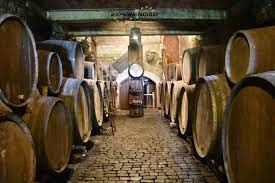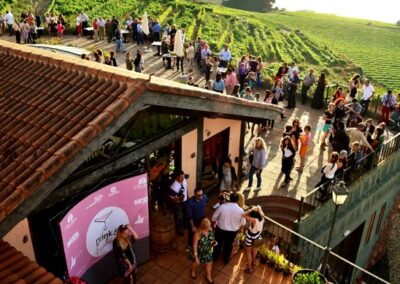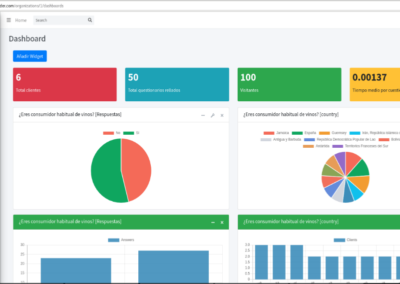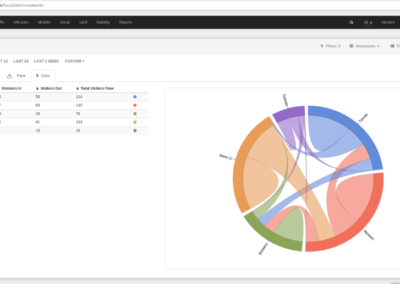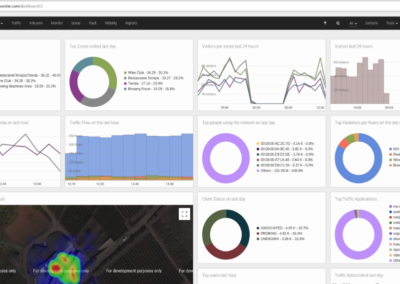Pilot Experiments
Cybersecurity and Big Data based solution for customer-centered design of wines
Experiment objective
The experiment was focused on data collection and big data analysis and visualization for optimizing customer centred design of wines making use of Cybersecurity and Big Data tools. By “customer centred design of wines” we mean that Bodegas Monje intends to produce and offer a product (wine) as much as possible customized to the customers’ expectative, which is critical in the wine industry.
For that purpose, the main technical objectives of the experiment were related to:
- Obtaining a better and more robust IT Network able to back the daily business and WiFi access in different areas.
- Implementing an IT system at Bodegas Monje well secured in general terms (internal data, clients’ information…) and offering secure payments to customers.
- Offering better products and services based on actual requirements and needs from customers.
Challenges
The main challenges and difficulties faced throughout the experiment execution were the following:
- During the initial phase, both the technical experts and the end users identified some minor changes in the scope that needed to be solved. The requested changes were identified and decisions made about the scope and new details to be implemented.
- Due to necessary and mandatory technical changes during the development and testing phases it was necessary to change some specific models of the initially listed and expected equipment. Once the final development and testing phase was done, the technical team adapted the initial design of the IT network in order to satisfy the final requirements.
- Some slight and marginal incompatibilities were detected during the testing phase among some of the technologies that did not work together as expected. The basic configuration of some of the technologies involved in the final solution were changed so that the final result at Monje fully accomplished initial expectations.
- It was not that easy to design and launch the first testing customer-centred questionnaire as it required the alignment of many departments at Bodegas Monje. The technical team supported Bodegas Monje during the definition of the questions so that the initial testing questionnaire was really customer-centred and not company-centred.
Implementation Solution
The experiment followed a well-structured process which covered the three working domains involved in the pilot, that is, the IT network, the cybersecurity platform and the Big Data customer-centred solution. The steps of the process were associated to the initial analysis, the specification and design of the infrastructure and tools, the selection of the hardware equipment, the implementation of the final solutions previously developed or customized, and the final testing and validation of technologies and platform.
As a consequence, two main digital solutions were developed, implemented and integrated into one single platform.
On one side, a cybersecurity solution adapted to the actual requirements of Bodegas Monje and to the specific IT equipment installed. Here the experiment developed the main dashboard for the company where the main characteristics and features can be visualised. The main widgets have to do with the analysis of customer physical behaviour (mainly position and traffic within the winery facilities) together with the network traffic analysis in order to detect cybersecurity issues. There is even an option where Bodegas Monje can see and analyse the flow of customers in the building and the relationship between places and users.
On the other side, a big data-based solution designed to collect, store, analyse and really make business decisions based on the customer feedback, that allows the winery to analyse their visitor’s behaviour and understand their opinion aggregating and digesting big data and even provide personalised options for each customer.
Results Obtained
As a result of the experiment, Bodegas Monje counts on a modern and completely secure network, being totally certain that the internal information about the business and also the stored data about customers are both secure and protected. In fact, we expect Bodegas Monje to be at the forefront of cybersecurity applied to what are the regular SMEs in the Canary Islands, and in this sense, being a best practice the CIDIHUB will use to extend the need and aim of digital transformation among local companies in the region.
On top of that, Bodegas Monje is now able to collect, store, digest and really make business decisions while providing feedback and retaining clients, out of the integrated IT solution implemented. Consequently, Bodegas Monje can analyse their visitors’ behaviour and understand their opinion aggregating big data as they need, structuring and restructuring market segments thanks to the power of technology. Their main aim is to provide better products (new or adapted wines) to better satisfy visitors. In fact, there is a new market segment that they want to approach as they did not do this in the past, the Millennials which require new types of wines (based on previous “personal evaluation” feedback).
Impact of the experiment
The experiment’s results caused a direct impact in Bodegas Moje’s processes and business operations that can be measured through different indicators such as:
- 2 new digital tools implemented
- Up to 5 different business units affected by the new processes implemented and thus digitalized (production, administration, marketing, innovation, sales)
- Reduction from 20 to 15% in the investment required for maintenance over the total budget of the production facilities in a year
- Reduction from 5 to 4.5% (measuring total production hours) in the amount of time spent on quality control procedures carried out
Furthermore, this kind of digital solution is expected to have a wider impact on the regional industry as a result of further implementation in many wine-related companies and beyond 300 wineries, as well as adapted to other strong local agri-food sectors such as tobacco as an example.

